The girl who picked up an AK-47 to defend her family
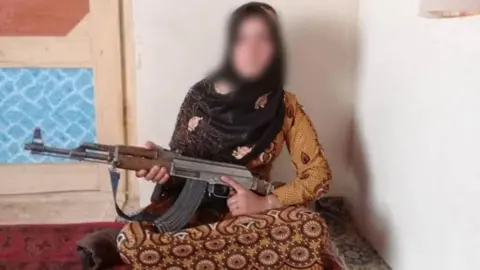 Ghor district government
Ghor district governmentWhen her home was attacked last month, 15-year-old Nooria picked up an AK-47, killing two men and wounding a third.
She was hailed as a hero. But the story behind what happened that night was more complicated.
Did Nooria shoot Taliban attackers, or her husband? Or both?
All names have been changed for safety reasons.

The men came to the village at night, under the cover of darkness.
According to Nooria, it was about 1am when they burst through the front door of her parents' home. In her bedroom, the teenager, who was woken by the noise, stayed still and quiet. She thought about her 12-year-old brother in his bedroom.
Then she heard the men take her parents outside the small, hillside home. She described the events of that night in an interview with the BBC.
The next thing she heard were gunshots, she said.
"They executed them."
Nooria had grown up in the small rural village, in a volatile part of Afghanistan. She was an outwardly shy and quietly spoken teenager, but capable of handling guns and firing them accurately - a product of self-defence training by her father from a young age.
That night, instead of hiding, Nooria grabbed her father's gun - an AK-47 rifle - and opened fire at the men outside. She fired until she was nearly out of bullets, she said.
Eventually, about an hour after they arrived, the men retreated into the night, she said. Outside the house lay five dead bodies: those of her mother and father, an elderly neighbour who was also her relative, and two of the attackers.
"It was horrific," she said. "They were so cruel. My father was disabled. My mother was innocent. And they just killed them."

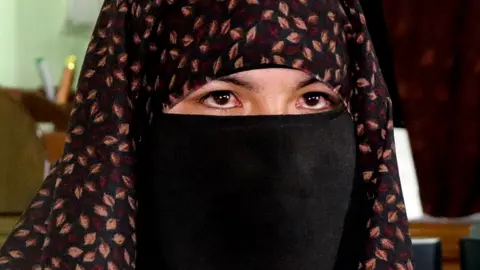 Getty Images
Getty Images
Growing up in Afghanistan, teenagers like Nooria have known nothing but war. The ongoing conflict between pro-government forces and the Taliban, the country's hard-line insurgent force, has waged for more than 25 years. Pro-government forces control cities and bigger towns, while the Taliban has seized vast remote areas. Villages like Nooria's are often caught in between.
In her rural province of Ghor, raids by small groups of Taliban fighters targeting pro-government outposts are not uncommon. Nooria and her older step-brother, a military police officer, say their father was targeted by insurgents because he was a tribal elder and pro-government community leader.
But three weeks on, multiple accounts of the attack and the circumstances around it - from Nooria, her older brother, family members of the dead attackers, local police, local elders, Taliban representatives, and the Afghan government - paint starkly differing versions of events.
According to several of the accounts given to the BBC, one of the gunmen that night was Nooria's husband, and the heroic story of a young girl fending off Taliban militants was in fact mired in a family dispute.
The conflicting accounts threaten to bury the truth of what happened to Nooria, and they reveal something of the tragic reality of life in rural Afghanistan - where young women are often caught up in a culture of tribalism, traditional custom and patriarchy that controls their lives. Like Nooria, they have little power, little access to education, and little say in how or when they are dragged into violence.
We can definitely say child marriage is illegal in Afghanistan and has been a serious challenge in Afghan society. According to AIHRC it is fairly common mainly in rural areas and Human Rights organisations have expressed concerns on number of cases of child marriage in the country with 70 cases registered only in 2019, while most of the cases remain unknown.

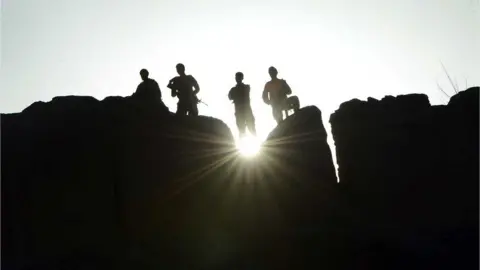 Getty Images
Getty Images
The most disputed element of what happened that night concerns the men who came to the house and why they were there. All sides agreed on one thing: that there was an attack in the village in the early hours of that morning.
According to Nooria, the strangers identified themselves as "mujahideen" fighters - a term often used by the Taliban - and they came for her father.
The Taliban denied any involvement in a clash with a teenage girl, but they did confirm there was a raid in the same village that night, saying a local police checkpoint was targeted resulting in two Taliban casualties, but no loss of life.
Local and national Afghan government officials meanwhile declared victory over a "massive" Taliban attack and proclaimed Nooria "a true hero".
As Nooria and her younger brother were airlifted out of their district by military helicopter and swept to a local safehouse, social media exploded with the story of the young girl who had taken up arms in self-defence.
It is not uncommon in Afghanistan for civilians to be praised by the president for defeating Taliban attacks. But when President Ashraf Ghani invited Nooria to the capital Kabul, reactions were mixed.

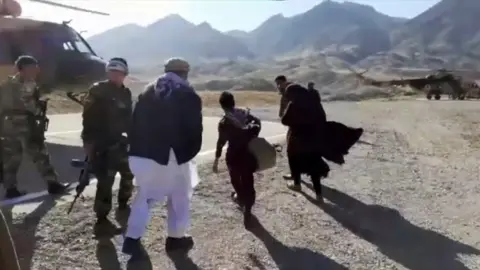 Local Afghan authorities
Local Afghan authorities
Some said she was a hero. Others said she was an innocent child caught between two warring sides - attacked by one, used as a PR stunt by the other.
"Can't understand how in a country whose people have seen enough death and violence to know the value of life and peace, can such glorify violence and praise take up arms," wrote one Twitter user. "Violence is not a response to violence!"
Another called Nooria a "symbol of Afghan women who succeeded to defend her life".
"There are many Afghan victims who couldn't do anything. They are suffering the pain of wounds they have because of holy war by Taliban."
At the scene of the attack the following day, local police discovered identity cards on the bodies of the two dead men. They were both known Taliban supporters, officers told the BBC.
A third man who was injured but escaped was a high-ranking Taliban commander called Sayed Massoum Kamran, police said.
The BBC was able to independently confirm the identity of the two dead men, who were in their late 20s and dressed in traditional Afghan attire, loose-fitting trousers and colourful waistcoats, their shirts now soaked through with blood.
And sources close to the Taliban said the commander named by police and alleged to have fled was indeed currently injured, but the sources would not confirm when or where he was hurt.
The local Taliban sources also confirmed that one of the men at the scene was previously affiliated with their network in Helmand, in southern Afghanistan, several years ago.

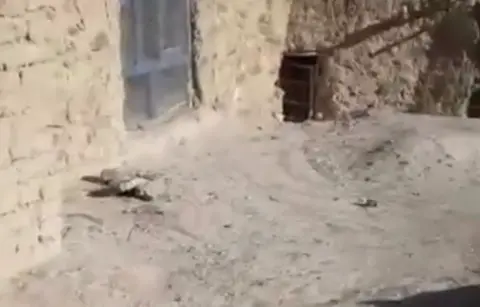

As Nooria and her 12-year-old brother arrived in the capital at the president's behest, the case of their parents' murder looked tragic but straightforward.
Then a week after the attack, reports began to circulate that one of the dead attackers was not simply an unknown fighter on a routine raid, but was in fact Nooria's husband.
Family members and local sources told the BBC that Nooria's husband, Rahim, came to the village intent on reclaiming his bride after a family dispute had led her father to take her home. The sources said the husband had become affiliated with the Taliban and came to the house with Taliban militants.
The man they identified as Nooria's husband was one of the men found dead that night.
Nooria denies they were ever married.
According to others, Nooria was part of a "mokhi" deal - an exchange of two female relatives for marriage between two families. Child marriage is illegal in Afghanistan but human rights organisations say it remains common in rural areas like Ghor, where girls can be bartered into agreements like the one described in Nooria's case.
Under the agreement, Rahim would take Nooria as his second wife while Nooria's father would marry Rahim's teenage niece as his second wife. However, since both the girls were still so young, it was agreed they would wait several years before making the marriage official.
Verifying the truth behind a story like this in rural Afghanistan is not easy. Nooria's village sits in a wide expanse of farmland, surrounded by steep mountains. Just to get a phone signal, villagers must trek to the top of a nearby hillside.
In order to establish whether Rahim was indeed Nooria's husband, the BBC tracked down his mother, Shafiqa, who lives in Nimruz province, south-west Afghanistan, with her son's first wife and their two children. Speaking down the phone from Nimruz, Shafiqa confirmed that her son married Nooria three years ago as part of an exchange, and that her other granddaughter, Rahim's niece, had also wed Nooria's father.
But she said that less than two years ago, while Rahim was working in Helmand, Nooria's father unexpectedly arrived at her house and took back his daughter, leaving his new wife, Rahim's niece, behind. Effectively nullifying the exchange, she said.

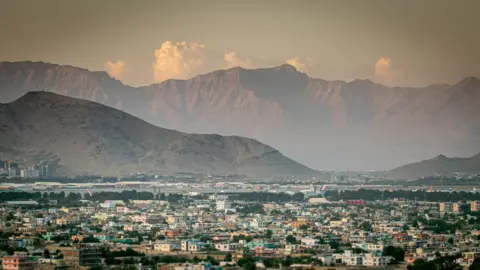

Shafiqa said they asked the elders to help heal the rift. But as the financially poorer family, they were powerless to stop Nooria's father.
She confirmed that Rahim went to Nooria's house on the night of the attack, but she denied it was with the intent of killing.
"They were strongmen. We were poor people. He didn't go there after midnight, he went there in the evening, invited by Nooria's father, to solve their problems, even to discuss a divorce," she said.
She denied that her son was a Taliban fighter, but her account of him travelling to Helmand for work does match the timing provided by Taliban sources - that he was a member of their network in Helmand almost two years ago before he went on to marry Nooria.
"My son was not a Taliban member, he was in construction," she said. "He never touched a gun in his entire life. We are poor people, nobody listens to us, nobody."
Shafiqa described losing her son, Rahim's brother, a police officer, 12 years ago in a suicide attack in Nimruz. Now there are no male earners left in her family. She is another woman in Afghanistan caught up in a cycle of violence outside of her control.

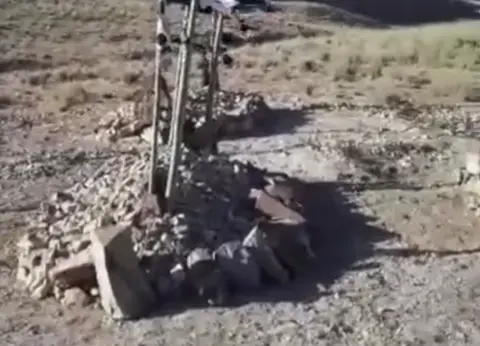

Local police in Nooria's province, along with several village elders and the central Afghan authorities, insist Rahim and Nooria were not married and the raid on her home was a routine Taliban raid, with her father the clear target.
Very few people truly know what happened that night. Nooria and her younger brother; a surviving attacker, perhaps. None may know the entire set of facts.
The morning after the violence, Nooria and her neighbours buried her parents in makeshift graves near to the house. As they put the dead into the ground, Afghanistan was preparing for the first direct peace talks between the government and the Taliban.
The talks carry the burden of hope for a different way of life in Afghanistan, but hundreds of Afghans are still being killed every month. Many are innocent women and children. Like Nooria, they have limited power and limited voice, and no choice but to continue to defend themselves, physically and emotionally, in whatever ways they can.
